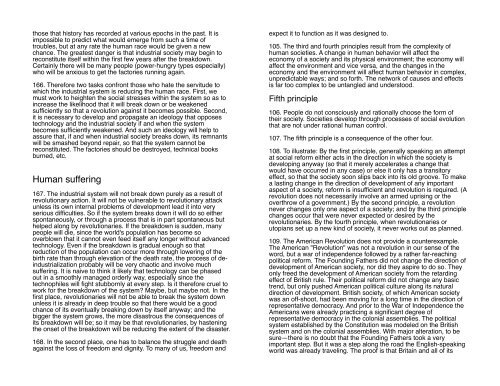Unabomber Manifesto - ouroboros ponderosa
Unabomber Manifesto - ouroboros ponderosa
Unabomber Manifesto - ouroboros ponderosa
Create successful ePaper yourself
Turn your PDF publications into a flip-book with our unique Google optimized e-Paper software.
those that history has recorded at various epochs in the past. It isimpossible to predict what would emerge from such a time oftroubles, but at any rate the human race would be given a newchance. The greatest danger is that industrial society may begin toreconstitute itself within the first few years after the breakdown.Certainly there will be many people (power-hungry types especially)who will be anxious to get the factories running again.166. Therefore two tasks confront those who hate the servitude towhich the industrial system is reducing the human race. First, wemust work to heighten the social stresses within the system so as toincrease the likelihood that it will break down or be weakenedsufficiently so that a revolution against it becomes possible. Second,it is necessary to develop and propagate an ideology that opposestechnology and the industrial society if and when the systembecomes sufficiently weakened. And such an ideology will help toassure that, if and when industrial society breaks down, its remnantswill be smashed beyond repair, so that the system cannot bereconstituted. The factories should be destroyed, technical booksburned, etc.Human suffering167. The industrial system will not break down purely as a result ofrevolutionary action. It will not be vulnerable to revolutionary attackunless its own internal problems of development lead it into veryserious difficulties. So if the system breaks down it will do so eitherspontaneously, or through a process that is in part spontaneous buthelped along by revolutionaries. If the breakdown is sudden, manypeople will die, since the world's population has become sooverblown that it cannot even feed itself any longer without advancedtechnology. Even if the breakdown is gradual enough so thatreduction of the population can occur more through lowering of thebirth rate than through elevation of the death rate, the process of deindustrializationprobably will be very chaotic and involve muchsuffering. It is naive to think it likely that technology can be phasedout in a smoothly managed orderly way, especially since thetechnophiles will fight stubbornly at every step. Is it therefore cruel towork for the breakdown of the system? Maybe, but maybe not. In thefirst place, revolutionaries will not be able to break the system downunless it is already in deep trouble so that there would be a goodchance of its eventually breaking down by itself anyway; and thebigger the system grows, the more disastrous the consequences ofits breakdown will be; so it may be that revolutionaries, by hasteningthe onset of the breakdown will be reducing the extent of the disaster.168. In the second place, one has to balance the struggle and deathagainst the loss of freedom and dignity. To many of us, freedom andexpect it to function as it was designed to.105. The third and fourth principles result from the complexity ofhuman societies. A change in human behavior will affect theeconomy of a society and its physical environment; the economy willaffect the environment and vice versa, and the changes in theeconomy and the environment will affect human behavior in complex,unpredictable ways; and so forth. The network of causes and effectsis far too complex to be untangled and understood.Fifth principle106. People do not consciously and rationally choose the form oftheir society. Societies develop through processes of social evolutionthat are not under rational human control.107. The fifth principle is a consequence of the other four.108. To illustrate: By the first principle, generally speaking an attemptat social reform either acts in the direction in which the society isdeveloping anyway (so that it merely accelerates a change thatwould have occurred in any case) or else it only has a transitoryeffect, so that the society soon slips back into its old groove. To makea lasting change in the direction of development of any importantaspect of a society, reform is insufficient and revolution is required. (Arevolution does not necessarily involve an armed uprising or theoverthrow of a government.) By the second principle, a revolutionnever changes only one aspect of a society; and by the third principlechanges occur that were never expected or desired by therevolutionaries. By the fourth principle, when revolutionaries orutopians set up a new kind of society, it never works out as planned.109. The American Revolution does not provide a counterexample.The American "Revolution" was not a revolution in our sense of theword, but a war of independence followed by a rather far-reachingpolitical reform. The Founding Fathers did not change the direction ofdevelopment of American society, nor did they aspire to do so. Theyonly freed the development of American society from the retardingeffect of British rule. Their political reform did not change any basictrend, but only pushed American political culture along its naturaldirection of development. British society, of which American societywas an off-shoot, had been moving for a long time in the direction ofrepresentative democracy. And prior to the War of Independence theAmericans were already practicing a significant degree ofrepresentative democracy in the colonial assemblies. The politicalsystem established by the Constitution was modeled on the Britishsystem and on the colonial assemblies. With major alteration, to besure—there is no doubt that the Founding Fathers took a veryimportant step. But it was a step along the road the English-speakingworld was already traveling. The proof is that Britain and all of its






